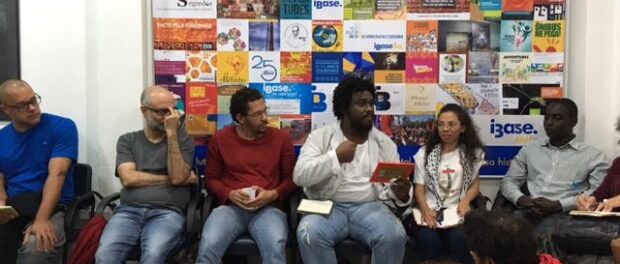
On the third day of the second annual Black July week, marking one year since Black Lives Matter activists visited their counterparts in Rio, the Rio de Janeiro Youth Forum organized a public debate about “Masculinity and Oppression by Sexism.” It was the first time sexism was debated during the series of events taking place this week.
The discussion with approximately sixty participants took place at the Brazilian Institute of Social and Economic Analysis (Ibase). Within minutes, the room was so crowded that people sat on the floor.
Marcus Nascimento of the Fernandes Figueira Institute of Women’s, Children’s and Teen Health at Brazil’s national health institute Fiocruz gave a brief introduction on Brazil’s omnipresent chauvinism. He focused on the multiple daily, often subtle forms of sexism most men perpetuate and experience, such as fathers showing affection for their sons only until a certain age. When their sons get older, their emotional education differs greatly to their daughters’. Also, when men meet, they are expected to slap each other on the back rather than exchanging hugs like women do. “We have to denaturalize violence,” he said. “Nobody is born violent.”
Subsequent speakers André Sobrinho of Fiocruz and Carlos Humberto of Diáspora Black reflected on their male privilege and the need to start with oneself rather than blaming others. Carlos brought a small mirror and asked every man present to take a look at himself and share his own personal story of sexism. The suggestion was welcomed by the audience, being dubbed “Sexists Anonymous.”
Examples of sexism raised by participants varied from “stealing” a kiss without asking to sleeping while the newborn wakes up every night. Others spoke of calling a poor sports performance “gay” or choosing “masculine professions” instead of “female careers.” Many told stories from their childhood, when they were better treated than their sisters, never asked to wash dishes and enabled to higher education. This preferential treatment at an early stage was an experience many of the participants shared.
The root causes remained in dispute, however. Carlos pointed out that “a lot of the stories begin with ‘my mother.’ So it is a female again who is being blamed for one’s own sexism.” In response, a mother who was present called out to other women to care more about themselves and stop reproducing a macho culture.
Another woman questioned the suffering that a sexist culture generates for men: “What happens to men that cannot fulfill the demands of masculinity? Often, they didn’t even learn how to cry.”
In his final statement André concluded: “To fight to lose your own privilege is really difficult.”

